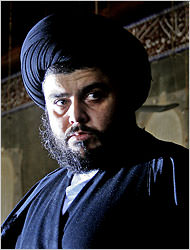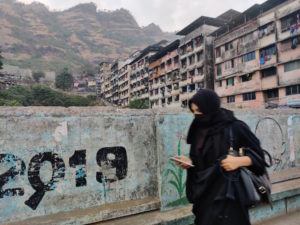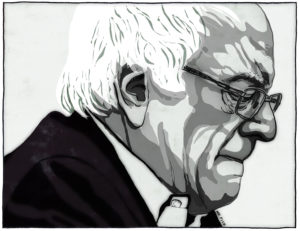A Bid to Ostracize Moqtada al-Sadr
Iraqi politicians have been meeting, with help from the Bush administration, to see if they can form a new coalition in Parliament to sideline the troublemaking Moqtada al-Sadr. The new group of Kurds, Sunnis and Shiites would have to attract moderates to find a way to handle Sadr's militia, with its estimated 60,000 men.
Iraqi politicians have been meeting, with help from the Bush administration, to see if they can form a new coalition in Parliament to sideline the troublemaking Moqtada al-Sadr. The new group of Kurds, Sunnis and Shiites would have to attract moderates to find a way to handle Sadr’s militia, with its estimated 60,000 men.
If Sadr is successfully ostracized, a direct confrontation with U.S. troops may be imminent.
Your support matters…New York Times:
After discussions with the Bush administration, several of Iraq’s major political parties are in talks to form a coalition whose aim is to break the powerful influence of the radical Shiite cleric Moktada al-Sadr within the government, senior Iraqi officials say.
The talks are taking place among the two main Kurdish groups, the most influential Sunni Arab party and an Iranian-backed Shiite party that has long sought to lead the government. They have invited Prime Minister Nuri Kamal al-Maliki to join them. But Mr. Maliki, a conservative Shiite who has close ties to Mr. Sadr, has held back for fear that the parties might be seeking to oust him, a Shiite legislator close to Mr. Maliki said.
Officials involved in the talks say their aim is not to undermine Mr. Maliki, but to isolate Mr. Sadr as well as firebrand Sunni Arab politicians inside the government. Mr. Sadr controls a militia with an estimated 60,000 fighters that has rebelled twice against the American military and is accused of widening the sectarian war with reprisal killings of Sunni Arabs.
The increasingly anarchic violence was highlighted Tuesday by a suicide car bomb that killed at least 56 people and wounded more than 220 in central Baghdad’s Tayaran Square, an area crowded in the morning with laborers seeking work.
The Americans, frustrated with Mr. Maliki’s political dependence on Mr. Sadr, appear to be working hard to help build the new coalition. President Bush met last week in the White House with Abdul Aziz al-Hakim, the leader of the Iranian-backed Shiite party, and is to meet on Tuesday with Tariq al-Hashemi, leader of the Sunni Arab party. In late November, Mr. Bush and his top aides met with leaders from Sunni countries in the Middle East to urge them to press moderate Sunni Arab Iraqis to support Mr. Maliki.
The White House visits by Mr. Hakim and Mr. Hashemi are directly related to their effort to form a new alliance, a senior Iraqi official said.
Independent journalism is under threat and overshadowed by heavily funded mainstream media.
You can help level the playing field. Become a member.
Your tax-deductible contribution keeps us digging beneath the headlines to give you thought-provoking, investigative reporting and analysis that unearths what's really happening- without compromise.
Give today to support our courageous, independent journalists.






You need to be a supporter to comment.
There are currently no responses to this article.
Be the first to respond.